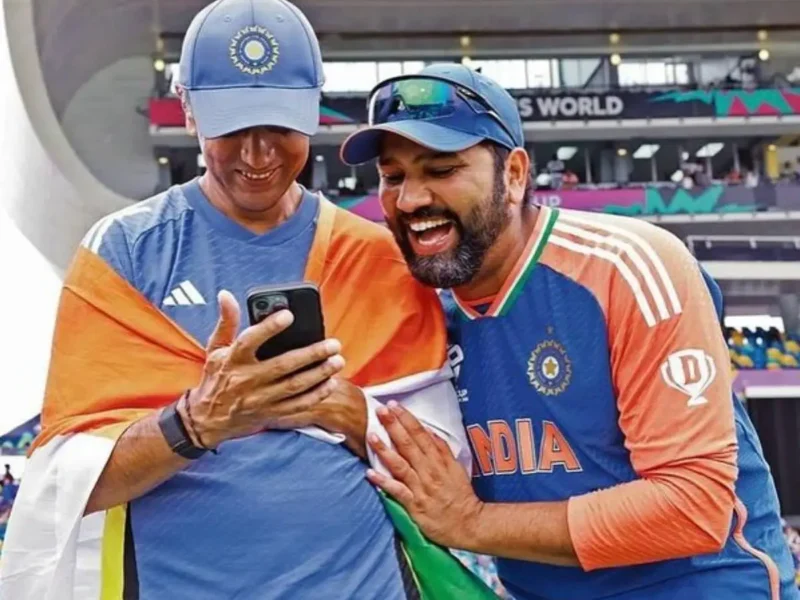
Vaccinating Children Most Important Factor in Turning Pandemic Around: Surgeon General Vivek Murthy
Vice President Kamala Harris talks with Surgeon General Dr. Vivek Murthy via video link during a meeting with founding members of the COVID-19 Community Corps to discuss public education efforts. Vaccinated against the coronavirus herself, Harris is continuing to push the message that vaccines are safe and save lives. The vaccine is perfectly safe for kids, the Indian American surgeon general asserted. (Chip Somodevilla/Getty Images)
By SUNITA SOHRABJI/India-West Staff Reporter
Vaccinating children is the most important factor to mitigating the Covid-19 pandemic in the U.S., said Surgeon General Vivek Murthy, at a May 19 White House briefing.
“I cannot underscore the importance of getting kids vaccinated,” said Murthy, the U.S.’s first Indian American Surgeon General who had served in the same role during the Obama administration.
Earlier this month, the Pfizer vaccine was approved in emergency authorization for children ages 12-15; prior to that, children 16-18 were allowed to get the vaccine, which is delivered in two doses. Children 12 and over get the same dose as adults.
Moderna, Johnson and Johnson, and Pfizer are conducting trials on younger children. By the beginning of 2022, Covid vaccines could be available for all children over the age of two.
Although children have done much better with managing the Covid virus, almost 15,000 have been hospitalized with severe conditions from the infection, and 297 have died, according to reports from the American Association of Pediatrics. Children now make up 21 percent of new infections.
Murthy spoke about his own children, who are 3 and 4, and having to have conversations with them about why they cannot see their grandparents. “Kids have missed birthday parties, slumber parties, and visits with cousins and friends.”
“Parents have had to consider so any risks, even just taking their children out to the playground,” he said.
The vaccine is perfectly safe for kids, Murthy asserted. Side effects, including flu-like symptoms and pain at the injection site, will show up relatively soon and will dissipate within a couple of days,” he said.
“If I can take a low risk for my child and make them safer, I want to do that,” said Murthy, adding: “I feel more hopeful than I have in a long time.”
But parental vaccine hesitancy is a huge determinant in whether children will get vaccinated. The Institute for Policy Research, a joint initiative of Northwestern, Harvard, Northeastern, and Rutgers universities, released a survey March 22 of almost 20,000 parents regarding vaccination of their children. Almost a third of young mothers between the ages of 18 and 35, and 23 percent of mothers ages 36 to 60 said they would definitely not vaccinate their children.
Bethany Robertson of Parents Together, who joined Murthy at the briefing, said children are making the decisions themselves. “They are dragging their parents to vaccination sites and saying: ‘I’m ready.’” Parents Together is using Instagram and TikTok to engage with kids about getting vaccinated.
Kristen McGuire, of Young Invincibles, said at the briefing: “Young people can be the messengers for their parents and younger siblings.”
Colorado pediatrician Sean O’Leary noted that vaccination sites must be made as convenient as possible. Schools are excellent locations, he said, noting that parents and children have easy access to vaccines there. O’Leary also advocated for pediatricians’ offices to get vaccine doses.
In a controversial decision last week, the Centers for Disease Control announced that fully vaccinated people, including children, no longer needed to wear face masks: full vaccination comes two weeks after receiving the second dose of the Pfizer or Moderna vaccine, or a single shot of the Johnson and Johnson vaccine.
Some public health experts have questioned the CDC’s announcement, noting that no proof of full vaccination is required, and that new mutant variants — which may or may not be immune to vaccines currently available — are increasingly showing up in the U.S. Murthy said during the briefing that people can still choose to wear masks, despite the CDC’s announcement, and that the agency will issue additional guidelines on mask wearing in schools and at retail outlets, such as grocery stores and shopping malls.
Covid-19 has killed more than 585,000 people in the U.S., over the past 14 months, and about 2.2 million people have been hospitalized. More than 275 million doses of the Covid vaccine have been administered, but millions of people, including 20 percent of elderly adults, have not yet been vaccinated.
Initial logjams in securing vaccine appointments have largely been cleared, and pharmacies are opening up walk-in vaccination sites.




